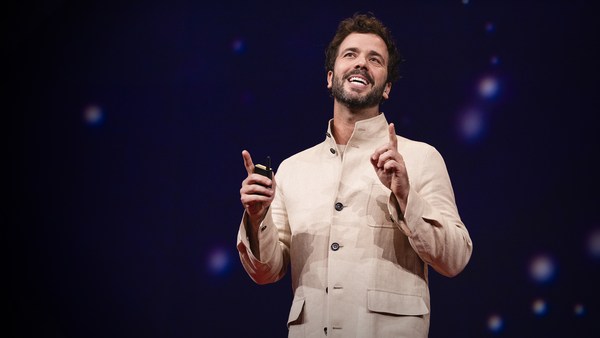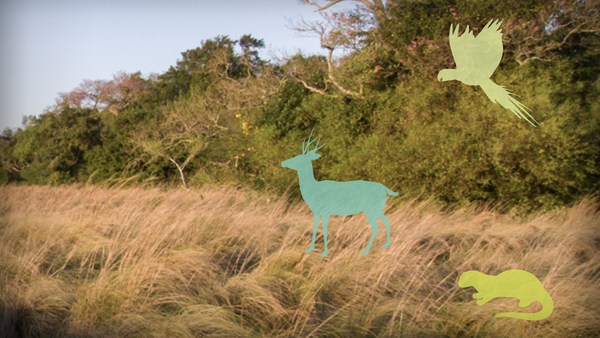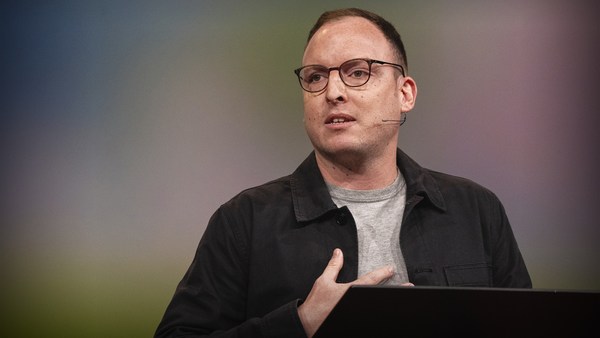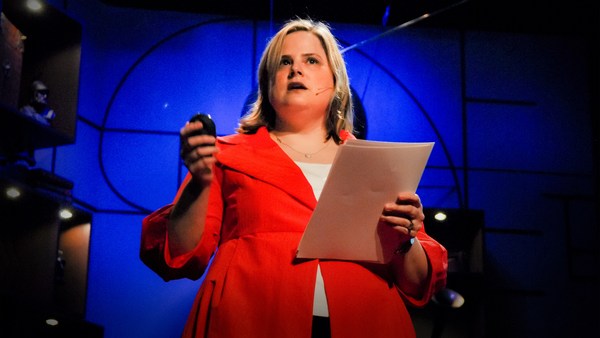Whitney Pennington Rodgers: Hi, Angus, thanks for joining me today.
Angus Hervey: Whitney, good to be with you.
WPR: So we've launched a series here at TED called TED Explains, where we take big headlines and break down what they mean and why they matter. And as we're thinking about the kind of stories we wanted to explain, one thing that came up in our conversations is you and the work that you do at Fix the News. So what is Fix the News? What is it that you do over there?
AH: Fix the News is founded on the idea that the biggest problem in media today isn’t the division between left versus right or the filter bubbles that we're stuck in. It’s the bad news bubble that we’re all stuck in. Because the news tells us what’s going wrong. It's a thing about failure and not success. And it's also true that the news is about sudden events, not gradual trends. It's about the unusual and not the commonplace. And as a result, vast waves of progress: extreme poverty declining, lifespans increasing, living standards rising, laws becoming more tolerant, diseases disappearing, oceans and forests being protected, clean energy replacing fossil fuels, those things are kind of invisible. A simpler way, really, of saying this is that terrible things might be happening in the world, but not everything that's happening in the world is terrible.
So at Fix the News we publish a newsletter and share this information with tens of thousands of people, and it's stories about what's going right. Powerful stories of progress that we distill into a succinct snapshot that connect people to the bigger picture and explain what progress is being made, what timeline it takes place over, what it took to get there and what the impact is.
WPR: Well, we've been really fortunate to have you share some of these big stories of progress over the course of two TED Talks that you’ve given, this past year being the most recent one. And they were the stories just as you've described, are these big stories that we might have missed because they were not covered in the news for one reason or another. We're really thrilled to have you share more of these stories with us as part of this special series within a series at TED Explains called TED Explains the News That You Missed, and this is the first of that series.
So since you gave your last talk, at this point, it's about six months ago, a lot has happened out in the world. So let's talk about a few of the big stories that you've been tracking. And one of those stories is probably something that was front and center for a lot of us at one point, which is the fight against AIDS. And I know there's some big news there lately. So what's the story there? What's been happening in that space?
AH: Well, AIDS is still a big deal. We don't hear about it in the news very much anymore. But it's killed over 40 million people since the pandemic first began. And there are around 40 million people worldwide who are living with HIV right now. So it's a big thing that has happened to humanity and continues to be a daily reality for a lot of people. At the end of July, UNAIDS held their annual conference, and at that conference they released data with some really incredible news showing that annual AIDS deaths have declined by 69 percent since their peak in 2004. So just to put this into context, at the peak of the AIDS epidemic, close to two million people died. It was one of the worst problems in the world. And in 2023, 20 years later, around 630,000 people lost their lives, which is still devastating. But in terms of progress against a disease, this really is one of the most remarkable stories in global public health. And the reason that it's been possible is because of access, mostly to antiretroviral therapies. There are 40 million people worldwide living with HIV right now, and more than 77 percent of those people have access to antiretroviral therapies and 84 percent of pregnant women, which prevents transmission to their child. And it's this, this access to these incredible medicines that's really driving the decline in overall mortality.
At the same conference, the UNAIDS conference in July, one of the most exciting moments, if not the most exciting moment, and certainly one of the most anticipated at the conference, was the release of data from a trial of a drug called Lenacapavir which showed that this drug, which only needs to be injected twice a year, has a 100-percent effectiveness rate in preventing the transmission. This is extraordinary. This is not the kind of thing that happens in medical trials. You don't get 100 percent effectiveness rates in anything really. And when the results of that trial were announced, I think the entire plenary leapt to their feet and started applauding. It was really an incredible moment. And AIDS researchers are incredibly excited about it. The next big battle, of course now is to get Gilead to release that drug to low- and middle-income countries at a price that people can afford. But certainly the future looks bright for a lot of people who have this disease. There's still a lot of questions around funding and the future trajectory, but really, I think we can all take a lot of comfort from the progress that has been made over the last 20 years.
WPR: Well, I know you're also always tracking progress on the battle against climate change and some big news for what's going on in the Amazon. What's happening there?
AH: Again, this is kind of as big as it gets. The Amazon also is a big deal. And I mean, I don't think I need to explain that. You know, people call it the lungs of the Earth for a reason. It's the largest rainforest in the world. And within the Amazon itself, most of the Amazon is taken up by the Brazilian Amazon. I think around two thirds of the entire Amazon basin is within Brazil. So really what happens in Brazil, kind of matters not just for the region and for the forest, but for the planet as a whole. And there has been some really incredible news coming out of Brazil. It was released last month by Brazil's space agency, showing that deforestation in the Brazilian Amazon has come down by 45 percent in the last 12 months. This is the largest proportional decrease in deforestation that they have ever recorded in 12 months. Under Bolsonaro, deforestation kind of skyrocketed, up to almost 10,000 square kilometers a year. And it's now down in the last 12-month period to below 5,000 square kilometers a year.
Now this is still a lot of deforestation. So this is not to say that the problem has been solved. Instead, it's an indicator of progress. And I think what's so heartening about this story is that when President Lula da Silva came into power at the beginning of 2023, one of his main campaign promises was to end illegal deforestation in the Brazilian Amazon. And what has happened there in Brazil is that the government has poured resources into Environmental Enforcement Agency and their Park Service. So this rhetoric is being backed by action, and we're seeing that in the results.
Now this doesn’t mean the Amazon is out of the woods, so to speak. We have a really problematic drought that's happening right now because of climate change. We have record amounts of fires in the Amazon, and a lot of the headlines have been about those problems. But I think that if you look over the span of the last 12 months, there are hugely encouraging signs of progress. And every reason to believe that Lula will continue to meet these promises of reducing illegal deforestation.
WPR: Well, across the globe and in another environmental issue, you're seeing something happening in China that's also really exciting. Tell us about that.
AH: Yeah, so this is I think, for me, this is the most important climate news of the year, which is why you're probably not seeing it in the headlines, which is that China is installing record amounts of wind and solar energy. 102 gigawatts of solar in the first six months of the year and 26 gigawatts of wind. Solar addition's up by 31 percent compared to last year, and wind addition's up by 12 percent. And last year, of course, was a record for deployment of renewable energy in China. So we're entering new territory here. And to kind of, again, put a bit of a marker on this, China has just hit its 1,200 gigawatt wind and solar goal, six years early. So in 2020, China had around 450 gigawatts of wind and solar, and they set a goal of reaching 1,200 gigawatts by 2030. And most energy analysts around the world said that that was too ambitious. And yet China has now hit that goal in July 2024. And as a result of this incredibly rapid deployment of clean energy, probably the most important story, certainly technology story, one of the most important technology stories and the most important climate story happening in the world right now. It looks like China's carbon emissions fell by one percent in the second quarter of 2024. And many energy analysts are saying that looking forward over the next, you know, four or five months that remain in the year, there is a more than 50 percent chance that China could see carbon emissions decline in 2024.
Of course, China is the largest carbon emitter in the world. So when China peaks, that means the rest of the world peaks as well. And it could mean that after the 300-year journey of carbon-led industrialization that we've been on, this year, 2024 marks the point at which the ship turns around, and we embark on the next 30 or 40-year journey of decarbonization. It's a seminal moment in the climate story and one which I wish was getting more headlines.
WPR: So up there with climate change, hunger is another one of these huge global challenges that seem insurmountable in some ways. But you've been seeing some exciting ways that schools are tackling this. Can you tell us a little bit more about that?
AH: So we're keeping it small here. We’ve done a disease, deforestation, climate change and now we're tackling hunger. So we're sticking to small subjects.
Hunger is a major issue in the world right now. It is one of the areas in which we're going in reverse. We've actually seen global hunger increase over the last few years, and largely as a result of war and and conflict. But within that story, there is a really bright spot. And that is the global effort to feed kids at school. This is one of the best ideas that human beings have ever had and also one of the simplest. When a kid comes to school, you give them a free meal. And what we've seen is we've seen this idea kind of take off, especially since the pandemic. But during the pandemic, when a lot of kids were out of school and a lot of governments were dealing with their crisis, this idea emerged as something that could address that. And a Global School Meals coalition was formed in 2021 to really help countries learn lessons from each other around how to provide school meals. And what we've seen is that those school meal programs are now reaching 480 million children in the world at the moment. That is up from 390 million children before the pandemic. So we've seen an extra 90 million children around the world get covered by these school meal programs. And the reason that this is such a good idea is that homegrown school feeding generates a return of something like nine dollars per dollar invested. And more importantly, it's a social protection program that reduces public budget expenditures, it unlocks agricultural development, it reduces malnutrition, it reduces healthcare costs, it increases school attendance. And kids learn better when they're learning on a full stomach. We've seen 101 countries join this School Meals Coalition since it was formed in 2021. It is one of the most exciting areas in global development anywhere right now.
The other place that with school meals some really exciting things are happening is actually in the United States itself, where more than 95,000 schools are serving free lunches to 21 million students each day. So this idea of free school meals is becoming increasingly popular in the United States. And again, the pandemic had a lot to do with this. And so this is really a kind of under-the-radar political movement, but one in which I think we're going to see increased traction in the United States over the coming years. So this is really an area to watch. But if you're looking for hope in the story of hunger, this school meals idea really is just absolutely incredible. And we're seeing some extraordinary progress happen all around the world.
WPR: Wow, yeah, it's amazing. And you took us all over the world in sharing about that, but ended in the United States. And so maybe we can stay there for a second. You also have some interesting things to share there about crime, which we know the United States experience with crime is sort of varied, but what's going on there currently?
AH: So the story of crime in the United States is always incredibly complex. Obviously a very politically loaded question as well. You know, it is a favorite of politicians in the United States and really in many senses, often used as a kind of avatar of the wider political and culture wars. Trying to kind of step backwards from it a little bit, though, and really just concentrate on what's happening in the data, we're seeing an extraordinary decline in crime in the United States right now. That after the spike in crime that happened during the pandemic, we're seeing historic declines across the board on violent crime, murder, rape, robbery, assault. This year, in 2024 alone, we've seen a roughly 16 percent decline in murder rates. And the decline of that magnitude would represent by far the largest one-year decline ever recorded. The previous record was a nine-percent decline in 1996. So murder rates have returned mostly to their pre-2020 levels now within the first six months of 2024, being slightly above where it was on average between 2017 and 2019. But if it continues at this rate, then in 2024, the murder rate will be below where it was in 2019. And that means that we're going to end up this year, probably with the lowest US homicide rate since 2014 and fifth lowest ever recorded.
It's not just that we're seeing violent crime decline as well. The Major Cities Chiefs Association's latest report on violent crime in 58 large US cities and 10 counties shows a 7.7 percent overall decline in the first quarter of 2024, with homicide down. Similar figures there, rape down 16.6 percent, robbery down three percent and aggravated assault down by eight percent. There are a lot of people who say that this data is somehow suspect because there is underreporting of crime that is happening right now, and in some respects that is true. Not as many crimes are reported now as in the past. But it is not a problem with underreporting from agencies around the United States, that there was a methodological change back in 2021 by the FBI that resulted in a blip. But most of US agencies, US law enforcement agencies, are now reporting their full crime data. So this is not to say that the crime problem has been solved in the US, but it is very, very encouraging. It says that things are returning back to normal, that the crime spike during the pandemic was an anomaly. It wasn't some kind of structural shift in how the United States operates. And what most people don't realize is that the United States, in fact, now is safer at any point than it has been in many decades. Certainly, if you're looking at the data. And that should be something that should be celebrated and encouraged on both sides of the political aisle.
WPR: Well, you've shared stories with us so far that, all of these stories have been about hopeful, promising things. But I think to end, there's a story about a major win for tolerance, social tolerance in Asia that feels like a really hopeful place to finish this off. So what's happening there?
AH: So the reason that we've obviously -- I think the reason that we call this series “the News that We Missed” is because most of the news that we miss tends to be good news, that the media -- that "if it bleeds, it leads" isn't just a colloquialism coined by some cutthroat tabloid editor. It's a potent, commercial reality for most media organizations in the world today. So this conversation might feel like it is heavily skewed or heavily weighted in favor of stories of progress, well, almost entirely in favor of stories of progress. But that's just because these stories just don't get nearly as much visibility. So kind of in that spirit, the story that I really wanted to finish with here, which you've asked me about, is what’s happening with same-sex marriage and wider kind of tolerance for LGBTQI+ communities in Asia.
Now if you look at a map of the world of where countries have legalized same-sex marriage, 38 countries have legalized same-sex marriage so far. And almost all of that has happened in the 21st century. North America, South America, Europe and then down here in Australasia. But really, where there's still a lot of work to be done is in Africa and Asia. But in Asia this year, we've seen some really encouraging stories. And on top of that list is Thailand's legalization of same-sex marriage. On the 18th of June, their Senate voted 130 to four to pass the same-sex marriage bill. And that means that Thailand, which is home to over 70 million people, becomes the first country in Southeast Asia, the third in Asia, and as I said before, the 38th country in the world, to recognize same-sex relationships. This is a huge milestone moment for LGBTQI+ people in Thailand. There are an estimated 3.7 million to four million people who identify as LGBTQI+ in that country. And while globally it has a reputation for tolerance for these communities, legally, they haven't been recognized until now. This is a mixed picture. There are many Asian countries where discrimination still exists and is still deeply entrenched. But I think this year what we're starting to see is we're starting to see shifts that that victory, particularly in Thailand, maybe signals a shift for the region as a whole. And this is an area to watch out for in the future. There is every likelihood that Asia, more generally, will become more generally tolerant, both legally and culturally, within the next five to 10 years. And that's something that we'll be tracking as well.
WPR: Well, it could actually be another name for this series, because I feel like with everything you've said, the reaction it's brought out of me is sort of wow, And this sense of awe and the goodness of people and humanity and the progress our world is making. We're so grateful to you for coming to share this with us today and for your talks. I feel like there's always an opportunity for us to learn something incredible about what's happening around us when we hear from you, and we're excited to have you do this with us every few months and have you back here to share more of these stories, which we know, what you shared today is just a fraction of what you've uncovered. So see you back here soon.
AH: Thanks, Whitney.



